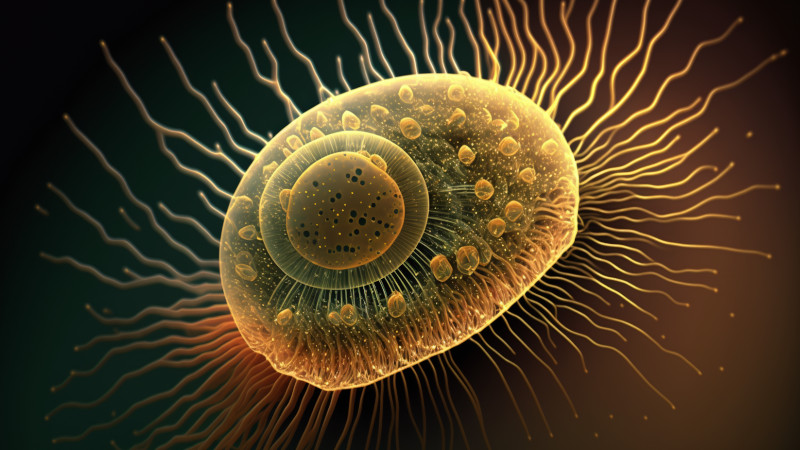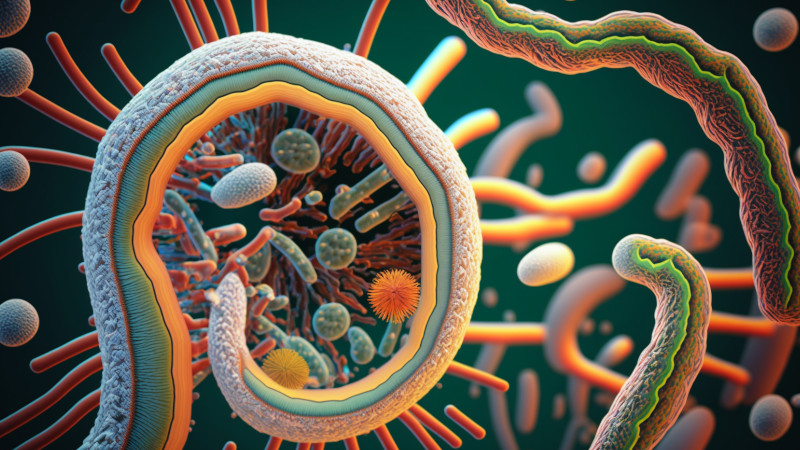Take a closer look at Fennel seed vs Anise (Pimpinella anisum). Did you know that these are two herbs that have been used for centuries to promote gut health and cleanse the body of parasites? Not only this, but while they share many similarities, there are also some key differences between the two that are important to consider when choosing which one to use for your health needs.
Both fennel seed and anise contain compounds that have been shown to have anti-inflammatory and antimicrobial properties, making them effective at fighting off harmful bacteria and parasites in the gut. 1 2
However, fennel seed is known for its ability to soothe digestive issues such as bloating and gas, while anise is often used to relieve symptoms of postpartum depression and promote lactation in nursing mothers. 3
When it comes to choosing between fennel seed and anise for gut health and parasite cleanse, it ultimately depends on your specific health needs and preferences.
Consulting with a healthcare provider or herbalist can help you determine which herbs are the best for your individual needs and ensure that you are using them safely and effectively.
Let’s get into the Fennel seed vs Anise discussion!
Table of Contents
What are Fennel Seeds?
As we opened with the Fennel seed vs Anise topic, there are distinct differences between fennel seeds and anise. Fennel seeds are the dried seeds of the Foeniculum vulgare plant, which is a member of the carrot family.
The plant is native to the Mediterranean region and has been used for centuries for its medicinal properties and as a culinary spice across many cultures.
Gut Health Benefits of Fennel Seeds
Fennel seeds have been traditionally used as a digestive aid due to their carminative properties, which means they help relieve gas and bloating. They also have anti-inflammatory properties that can help soothe inflammation in the digestive tract. 4
Additionally, fennel seeds contain fiber, which can promote regular bowel movements and support overall gut health.
Parasite Cleanse with Fennel Seeds
Fennel seeds have been used in traditional medicine as a natural remedy for parasites, particularly intestinal worms. The seeds contain compounds that have anthelmintic properties, which means they can help expel parasites from the body. 5
In addition, fennel seeds have antimicrobial properties that can help prevent the growth of harmful bacteria and fungi in the gut. 6

What is Anise?
Anise is a flowering plant that belongs to the same family as carrots, celery, and parsley. It is native to the eastern Mediterranean region and Southwest Asia, but now it is widely cultivated in many parts of the world for its seeds.
Gut Health Benefits of Anise (Pimpinella anisum)
Anise has also been used for centuries in traditional medicine to promote digestive health. The active constituents in anise, particularly the terpenoid anethole, are contained in its volatile oil. 7
Anethole has been shown to have antispasmodic and carminative effects, which means that it can help relieve intestinal cramps, bloating, and gas. 8
Moreover, anise has been shown to stimulate the production of digestive enzymes, which can help break down food more efficiently and improve nutrient absorption. This can lead to better overall gut health and may even help prevent digestive disorders such as irritable bowel syndrome (IBS) and inflammatory bowel disease (IBD). 9
Parasite Cleanse with Anise
Anise has also been used traditionally to treat parasitic infections. The anethole derived from it has been shown to have antifungal, antibacterial, and antiparasitic properties, which can help eliminate harmful microorganisms in the gut. 10
Studies have shown that anise has anthelmintic properties. As such it is understood to be effective against a variety of parasites, including tapeworms, hookworms, and roundworms.11 12 13
Anise can be consumed as a tea, or the essential oil can be added to water or other beverages.
Fennel Seed vs Anise: Which is Better for Gut Health?
As we have covered in the earlier sections, both fennel seeds and anise have been used for centuries for their medicinal properties, particularly for digestive issues. But the question remains; ‘Which one is better for gut health?’
Let’s take a closer look at some of the similarities and differences between Fennel seed vs Anise.
Fennel Seed vs Anise Similarities
Fennel and anise are both members of the Apiaceae family and contain the compound anethole, which gives them their characteristic licorice-like flavor. They both have antispasmodic properties that can help relieve bloating, cramping, and other digestive discomforts. 14 15
They are also rich in antioxidants and have anti-inflammatory properties that may help protect against certain diseases. 16 17
Fennel Seed vs Anise Differences
While fennel and anise share many similarities, there are some key differences between the two. From an appearance and flavour perspective, fennel seeds are larger and have a milder flavour with a slightly sweet, nutty taste. They are often used in cooking and baking, particularly in Mediterranean and Middle Eastern cuisine.
Anise, on the other hand, has a stronger, sweeter flavour with a more pronounced licorice taste. It is commonly used in liqueurs and confections, as well as in traditional medicine.

When it comes to gut health, both fennel and anise have been shown to have beneficial effects. Fennel seeds have been found to have antimicrobial properties that can help fight off harmful bacteria in the gut, while anise has been shown to have antiparasitic properties that may help cleanse the digestive system of parasites.
Both herbs can also help stimulate digestive enzymes and improve overall digestion.
See also the comparisons between:
Fennel Seed vs Anise Nutritional Content
Let’s consider the nutritional values of Fennel seed vs Anise. The table below breaks down various aspects of the common nutritional profile.18 19
| Nutritional Value per 100g | Anise | Fennel Seeds |
| Vitamin B3 | 3.06 mg | 6.05 mg |
| Polyunsaturated fat | 3.15 g | 1.69 g |
| Fibre | 14.6 g | 39.8g |
| Calcium | 1002 mg | 1196 mg |
| Phosphorous | 440 mg | 487 mg |
| Zinc | 5.3 mg | 3.7 mg |
| Iron | 36.96 mg | 18.54 mg |
| Magnesium | 170 mg | 385 mg |
| Potassium | 1441 mg | 1694 mg |
| Manganese | 2.3 mg | 6.53 mg |
| RDI per 100g | Anise | Fennel Seeds |
| Sodium | 1% | 4% |
| Zinc | 48.33% | 33.67% |
| Copper | 101.3% | 118.67% |
| Calcium | 64.6% | 119.67% |
| Iron | 462% | 232% |
| Magnesium | 40.6% | 91.67% |
| Phosphorous | 63% | 69.67% |
| Potassium | 42.6% | 50% |
| Vitamin B12 | 0% | 0% |
| Vitamin B6 | 50% | 36.33% |
| Vitamin B5 | 16% | 0% |
| Vitamin B3 | 19.3% | 38% |
| Vitamin B2 | 22.3% | 27.33% |
| Vitamin B1 | 28.6% | 34% |
| Vitamin C | 23.3% | 23.33% |
| Vitamin D | 0% | 0% |
| Vitamin E | 0% | 0% |
| Vitamin A | 6.3% | 3% |
| Vitamin K | 0% | 0% |
| Folate | 2.6% | 0% |
| Macronutrient Content | Anise | Fennel Seeds |
| Protein | 17.6g | 18% | 15.8g | 16% |
| Fats | 15.9g | 16% | 14.87g | 15% |
| Carbohydrates | 50.02g | 50% | 52.29g | 52% |
| Water | 9.54g | 10% | 8.81g | 9% |
| Other | 6.94g | 7% | 8.23g | 8% |
| Fat Content | Anise | Fennel Seeds |
| Saturated Fats | 0.586 g | 0.48 g |
| Monounsaturated Fats | 9.78 g | 9.91 g |
| Polyunsaturated Fats | 3.15 g | 1.69 g |
FAQs
What is the difference between Fennel Seed and Anise?
Fennel seeds come from a bulbing plant that is eaten as a vegetable, while Anise comes from a bush that is grown specifically for the seed; no other part of the plant is eaten.
Both plants belong to the same Apiaceae family. While fennel has a far lighter taste that plays on the more herbaceous side of the traditional licorice taste, anise is heavier on the licorice flavor and far more pungent.
Fennel Seed vs Anise; Which is Better for Gut Health
Both fennel seed and Anise have been used traditionally for their medicinal properties, including their ability to aid digestion and relieve gas and bloating.
Fennel seed has been shown to have anti-inflammatory properties and may help protect against certain types of cancer. 20
Anise has been used to treat parasites and other digestive issues. However, more research is needed to determine which is better for gut health.
How can I use Fennel Seed and Anise for a Parasite Cleanse?
Regardless of which you choose in the Fennel Seed vs Anise comparison, both can be used in combination with other herbs for a parasite cleanse. Both can be brewed into a tea or added to food for flavor and medicinal benefits. However, it is important to consult with a healthcare professional before starting any parasite cleanse or using herbal remedies for these purposes.
Are there any Side Effects of using Fennel Seed and Anise?
Fennel seed and Anise are generally safe when used in moderation. However, some people may experience allergic reactions or digestive upset. It is important to talk to your healthcare provider if you experience any adverse effects.
Conclusion
Both fennel seed and anise have been used for centuries to support gut health and cleanse the body of parasites. While they share similarities such as anti-inflammatory and antimicrobial properties, they also have unique benefits.
The choice between fennel seed and anise for gut health and undertaking a parasite cleanse depends on the individual’s health needs and preferences. Consulting with a healthcare provider or herbalist can help you determine the best herb for your specific needs and ensure safe and effective usage.
The Fennel seed vs Anise discussion has presented that it is more a case of combination than separation in the benefits that these two offer. Incorporating both herbs into your diet may provide comprehensive benefits for gut health.
It is important to note that while fennel seeds and anise may have some benefits for gut health and parasite cleansing, they should not be used as a substitute for medical treatment. If you suspect you have a parasite infection, it is important to consult with a healthcare professional for proper diagnosis and treatment.
Sign up for our mailing list to receive more valuable insights on gut health, parasite cleansing, and other natural remedies, as well as updates on the latest research and information on herbal medicine. Also, join the Fennel seed vs Anise discussion on Instagram and Pinterest and share your thoughts.
References
- “Effect of Foeniculum Vulgare Aqueous and Alcoholic Seed Extract against Zoonotic Cutaneous Leishmaniasis” – G. Mostafa, N. Jalallou, S. J. Seyyedtabaei, A. Dadashi, S. E. S. Sabour, 31 March 2021 [PubMed] [Archive] ↩︎
- “In-Vitro Antibacterial and Antifungal Effects of High Levels of Chinese Star Anise” – M.S. Alhaj, jM.A.A. Qasem, A.R. Jar El Nabi, S.I. Al-Mufarrej, 11 November 2019 [SciELO] [Archive] ↩︎
- “Oral galactagogues (natural therapies or drugs) for increasing breast milk production in mothers of non-hospitalised term infants (Review)” – S. C. Foong, M. L. Tan, W. C. Foong, L. A. Marasco, J. J. Ho, J. H. Ong, 2020 [Cochrane Library] [Archive] ↩︎
- “Handbook of Herbs and Spices, Volume 2” – K. V. Peter, 2012 [ScienceDirect] [Archive] ↩︎
- “Effect of Foeniculum Vulgare Aqueous and Alcoholic Seed Extract against Zoonotic Cutaneous Leishmaniasis” – G. Mostafa, N. Jalallou, S. J. Seyyedtabaei, A. Dadashi, S. E. S. Sabour, 31 March 2021 [PubMed] [Archive] ↩︎
- “The effect of a fennel seed extract on the STAT signaling and intestinal barrier function” – B. Das, J. Rabalais, P. Kozan, T. Lu, N. Durali, K. Okamoto, M. D. McGeough, B. J. Lee, K. E. Barrett, R. Marchelletta, M. Sivagnanam, Date [PubMed] [Archive] ↩︎
- “Influence of Trans-anethole on the nutrient digestibility and intestinal barrier function in broilers” – C. Yu, J. Zhang, H. Zhang, Y. Chen, C. Wang, L. Zhang, L. Ding, T. Wang, Z. Yang, 20 September 2021 [PubMed] [Archive] ↩︎
- “The hepatoprotective effects of fennel seeds extract and trans-Anethole in streptozotocin-induced liver injury in rats” – Z. S. Noshahr, M. A. R. Hadjzadeh, R. M. Marjaneh, A. K. Rad, 30 December 2020 [Wiley] [Archive] ↩︎
- “Aqueous suspension of anise “Pimpinella anisum” protects rats against chemically induced gastric ulcers” – I. A. Al Mofleh, A. A. Alhaider, J. S. Mossa, M. O. Al-Soohaibani, S. Rafatullah, 21 February 2007 [PubMed] [Archive] ↩︎
- “Effects of star anise (Illicium verum Hook. f) and its extractions on carcass traits, relative organ weight, intestinal development, and meat quality of broiler chickens” – X. Ding, C. Yang, P. Wang, Z. Yang, X. Ren, 7 August 2020 [PubMed] [Archive] ↩︎
- “Complementary and Alternative Medicine – Intestinal parasites” – At. Luke’s Staff, 27 April 2016 [St. Luke’s Hospital] [Archive] ↩︎
- “Star anise ( Illicium verum ): Chemical compounds, antiviral properties, and clinical relevance” – J. K. Patra, G. Das, S. Bose, S. Banerjee, V. C. N, M. D. P. Rodriguez Torres, H. Shin, January 2020 [ResearchGate] [Archive] ↩︎
- “Pharmaceutical Perspectives of Spices and Condiments as Alternative Antimicrobial Remedy” – S. P. D’Souza, S. V. Chavannavar, B. Kanchanashri, S. B. Niveditha, 28 April 2017 [PubMed] [Archive] ↩︎
- “Pimpinella anisum and female disorders: A review” – M. Mahboubi, M. Mahboubi, 16 February 2021 [ScienceDirect] [Archive] ↩︎
- “Foeniculum vulgare Mill: A Review of Its Botany, Phytochemistry, Pharmacology, Contemporary Application, and Toxicology” – S. B. Badgujar, V. V. Patel, A. H. Bandivdekar, Date [PubMed] [Archive] ↩︎
- “Anethole and Its Role in Chronic Diseases” – A. C. Aprotosoaie, I. . Costache, A. Miron, 2016 [PubMed] [Archive] ↩︎
- “Chemical Constituents, Antioxidant Potential, and Antimicrobial Efficacy of Pimpinella anisum Extracts against Multidrug-Resistant Bacteria” – A. N. AlBalawi, A. Elmetwalli, D. M. Baraka, H. A. Alnagar, E. S. Alamri, M. G. Hassan, 10 March 2023 [MDPI] [Archive] ↩︎
- “Spice, Anise Seed” – USDA Staff, 1 April 2019 [USDA] [Archive] ↩︎
- “Fennel seeds” – USDA Staff, 1 April 2019 [USDA] [Archive] ↩︎
- “10 Science-Based Benefits of Fennel and Fennel Seeds” – J. Kubala, A. Arnason, 13 February 2023 [Healthline] [Archive] ↩︎
Last Updated on 6 months by D&C Editorial Team


